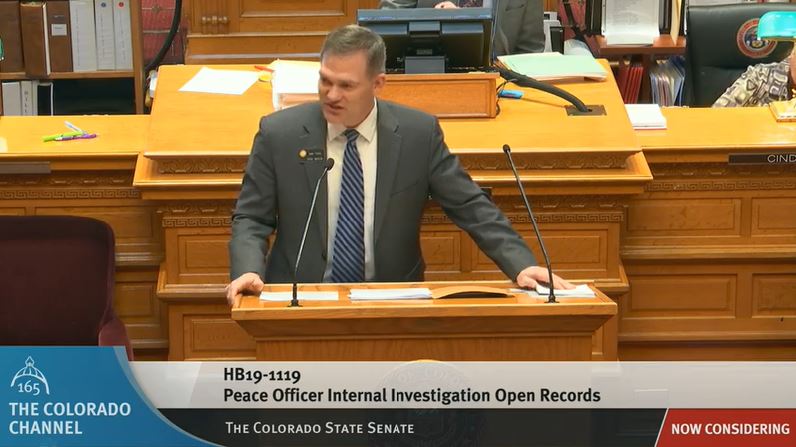Update: The Senate voted 19-16 on Wednesday, Mar. 27, to send HB 19-1119 to Gov. Polis’ desk.
By Jeffrey A. Roberts
CFOIC Executive Director
A preliminary vote in the Senate on Tuesday moved Colorado closer to joining other states that allow public access to records of completed law enforcement internal affairs investigations.
House Bill 19-1119, which passed the House last month, will be sent to Gov. Jared Polis if it survives a final Senate vote with no amendments.
If signed into law, the measure would upend a long-standing practice among most law enforcement agencies in Colorado to routinely reject public records requests for internal affairs files either by blanket policy or a finding that disclosure would be “contrary to the public interest.” The bill makes files related to specific incidents of an officer’s on-duty or in-uniform conduct “records of official action” that must be disclosed after certain redactions.
“It seems to me that transparency should be the default position – that’s what this bill does,” said Sen. Mike Foote, the Lafayette Democrat who is sponsoring HB 19-1119 with Rep. James Coleman, D-Denver.

Foote, a former prosecutor, said the legislation will help to build trust between law enforcement agencies and the communities they serve. Routinely denying access to completed internal affairs records, he said, may give the public the impression that agencies “have something to hide … Maybe that’s not fair, but that’s what people think.”
The Senate floor debate Tuesday morning featured arguments and counter-arguments from Foote and Sen. John Cooke, a Greeley Republican who formerly served as Weld County sheriff.
Cooke said there is no evidence that disclosure of internal affairs records enhances an agency’s standing in a community. “Either you have a good reputation with your community already or you don’t,” he told Senate colleagues.
Cooke also contended the bill unfairly singles out one type of public employee – law enforcement officers – and effectively “eliminates one side of the scale so that a peace officer’s safety and privacy cannot be considered” before records are released. Under case law interpreting the Colorado Criminal Justice Records Act, he noted, records custodians are required to balance competing interests before releasing internal affairs files.
And if records are withheld, Cooke added, “somebody can go to court and then an impartial judge can look at it.”
Foote pointed out that news organizations and individuals usually win lawsuits that seek public disclosure of internal affairs files “because there is such a public interest.”
“But, in my opinion, you shouldn’t have to rely on litigation. You shouldn’t have to rely on hiring an attorney … to get these files,” Foote said. “It’s in the public interest to disclose these files, and it’s in the police agency’s interest to disclose these files.”
He also noted that local governments have paid high-dollar settlements to people who accuse police officers of misconduct, but still refuse to release internal files related to those cases.
HB 19-1119 is similar to unsuccessful 2018 legislation but includes additional provisions aimed at protecting the privacy of witnesses, victims, confidential informants and officers who participate in an internal affairs investigation but aren’t the subject of the investigation.
The measure parallels what Denver has been doing for about a dozen years; it is the only jurisdiction in Colorado that consistently makes internal affairs records available to the public, as do 14 other states.
Under HB 19-1119, law enforcement agencies would be permitted to first provide a summary before giving access to an entire internal affairs file. The bill only applies to internal affairs investigations started after the bill’s effective date.
The Colorado Freedom of Information Coalition supports HB 19-1119 as do the American Civil Liberties Union of Colorado, the Colorado Press Association, the Colorado Broadcasters Association, Common Cause of Colorado and the Independence Institute.
Opponents of the bill include the Fraternal Order of Police of Colorado and the county sheriffs’ association. The police chiefs’ association, district attorneys’ council and the Colorado Municipal League are taking neutral positions.
Follow the Colorado Freedom of Information Coalition on Twitter @CoFOIC. Like CFOIC’s Facebook page. Do you appreciate the information and resources provided by CFOIC? Please consider making a tax-deductible donation.




